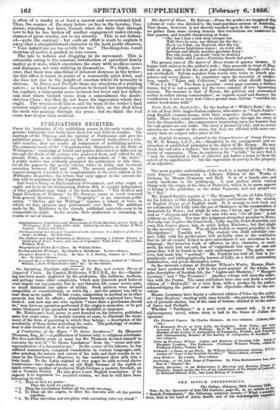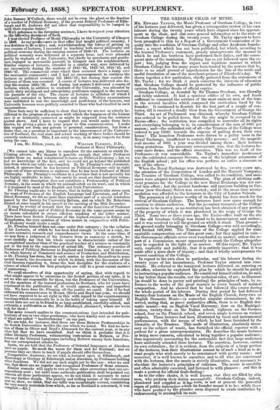THE SCOTCH PROFESSORIAT.
The College, Glasgow, 26th January 1858. Sin—In the Spectator of date 23d January, page 91, in an article on the "Scotch Professoriat," the following sentence occurs—" What a scandal, then, that in the land of Adam Smith and of his indefatigable expositor
John Ramsay M'Culloch, there would not be even the ghost or the fraction of a teacher of Political Economy, if the present Ethical Professors of Edin- burgh and St. Andrews did not allow that responsibility to be lumped in with their regular duties !" With reference to the foregoing sentence, I have to request your attention to the following statement of facts.
I was elected Professor of Moral Philosophy in the University of Glasgow in 1840. As my predecessors in that office had taught political economy, I was desirous to do so also; and, notwithstanding the labour of getting up two courses of lectures, I succeeded in teaching both moral philosophy and political economy during the ensuing session of 1840-'41. The lectures on political economy were delivered at a separate hour, and were attended partly by students of the University, but chiefly by merchants and gentle- men engaged in mercantile pursuits in Glasgow and the neighbourhood. Similar courses of lectures, attended in a similar way, were delivered by me successively during the sessions of 1841-'42, 1842-'43, 1844-'45, and 1846-'47. The commercial crisis which then occurred threw a damp over the mercantile community; and I had no encouragement to continue the lectures on political economy till 1852-'53; but during that session the delivery of them was resumed. A course of lectures was delivered also du- ring the session 1855-'56. And during last session I delivered a course of lectures, which, in addition to students of the University, was attended by nearly sixty intelligent and enterprising gentlemen engaged in the mercan- tile pursuits of the city'. The course of lectures (a syllabus of which I transmit) extended to between thirty and forty. Written examinations were instituted to test the knowledge and proficiency of the hearers, and University honours were publicly awarded to those who had excelled in such examinations.
These facts may be sufficient to show that here we are not so utterly in- different to the progress of a science with which the happiness of the human race is so intimately connected as might be supposed from the sentence quoted above. And I have to request that you would make these facts known, by giving a place in your paper to this communication. I make this request not from any private or personal considerations, but from a desire that, on a question so important as the improvement of the Universi- ties of Scotland, the real state and actual working of these bodies should be correctly understood. This, I am sorry to say, is in many respects far from being the case.
I am, Mr. Editor, yours, &c. WILLIAM FLEMING, D.D., Professor of Moral Philosophy. [We cannot take any blame to ourselves for the omission to which Dr. Fleming adverts. We thought it possible enough that other Professors besides those we noted volunteered lectures on Political Economy ; but we had no knowledge of the fact, and we could not go beyond the published lists from which our table was compiled. By Dr. Flemings own statement, indeed, it appears that he has lectured on Political Economy only in eight years out of Borne seventeen or eighteen that he has been Professor of Moral Philosophy. Dr. Fleming's exertions in a province that is not specially, his are highly creditable to him; but surely he must see that desultory volun- teering of this description does not constitute a Professorship of Political Economy, lathe sense in which we animadverted on its want, and in which it is possessed by most of the English and Irish Universities.
Dr. Fleming ought also to be aware, that in laying particular stress upon the want of Professors of the English Language and Literature, and of Po- litical Economy, we did no more than reproduce part of a special resolution passed by theSocietyfor University Reform, and on which Dr. Robertson dilated at some length in his speech at the meeting of the 30th December. It may be worthy of remark that the union of the functions of Professor of Moral Philosophy and of Political Economy in the same person seems by no means calculated to secure efficient teaohing of the latter science. There have been Scotch Professors of the highest eminence in Ethics and Metaphysics, the very mention of whose names in conjunction with Politi- cal Economy would excite a smile.
Dr. Fleming himself does not come under this category ; for the syllabus of his Lectures, of which he has been kind enough to send us a copy, in- dicates extensive research and comprehensive views. At the same tame, if we may form a judgment of his lectures from so summary a sketch., we must candidly say that his whole course is characteristic rather of the accomplished amateur than of the practical teacher of a science so constantly, put to the test by the experience of actual life. The ordinary practice of Professors of Political Economy in England and Ireland is, not to run over the whole history of Commerce and science of Production and Distribution, as Dr. Fleming has done, but in each session to devote themselves to some special branch, the treatment of which in detail, with the discussion of the rival theories regarding it, forms the best discipline for the students of a science of which even the first principles are still to a great- extent matters of controversy.
We avail ourselves of this opportunity of saying, that with regard to what might appear to be omissions in the Scotch portion of our table, it is not we who are responsible for them, but the Professors of the Universities, and the members of the learned professions in Scotland, who for years have acquiesced in the publication of it would appear, meagre and imperfect has. We have done Dr. Fleming all the justice we could. But if he had addressed his remonstrance to Messrs. Oliver and Boyd last year, we should not have required to be set right in this with regard to the supernumerary functions which occasionally he is in the habit of taking upon himself. If correct lists are not to be found in so long-established, carefully-edited, and authentic a publication as the New Edinburgh Abinuttack, where are we to look for them?
The same remark applies to the communications (not intended for pub- lication) of one or two other gentlemen, who have kindly sent us corrections of what are called " inadverthncies " on our part. We are told, for instance, that there are three Hebrew Professorships in the Scotch Universities besides the one which we noted. We find no men- tion of them in Oliver and Boyd's Almanack for the current year, or in any other list that we have consulted. And we think it probable that it is either Divinity Professors, volunteering instruction in Hebrew, or Pro- fessors of the Oriental Languages including Hebrew among their functions, that our correspondent alludes to. Again, we are told that the Professors of Oriental languages at Aberdeen have no pupils. So much the worse for them and for Scotland; but we presume they are there to teach if pupils should offer themselves. Comparative Anatomy, we are told, is lectured upon at Edinburgh, and rmeralogy or Geology at Edinburgh and at Aberdeen, by Professors holding other functions. We did not say such might not be the case: what we said Wes, that there are no regular and recognized Professors of those sciences.
Similar remarks will apply to two or three other corrections that our cor- respondents send ; but until some authentic publication shall be pointed out .711erein all those particulars appear, we do not think it necessary to enter into any further details. The paucity and trifling nature of the corrections sent us, show, we think, that our table was surprisingly correct, considering the very scanty materials from which, so far as Scotland is concerned, it was eempiled.—En.]



































 Previous page
Previous page